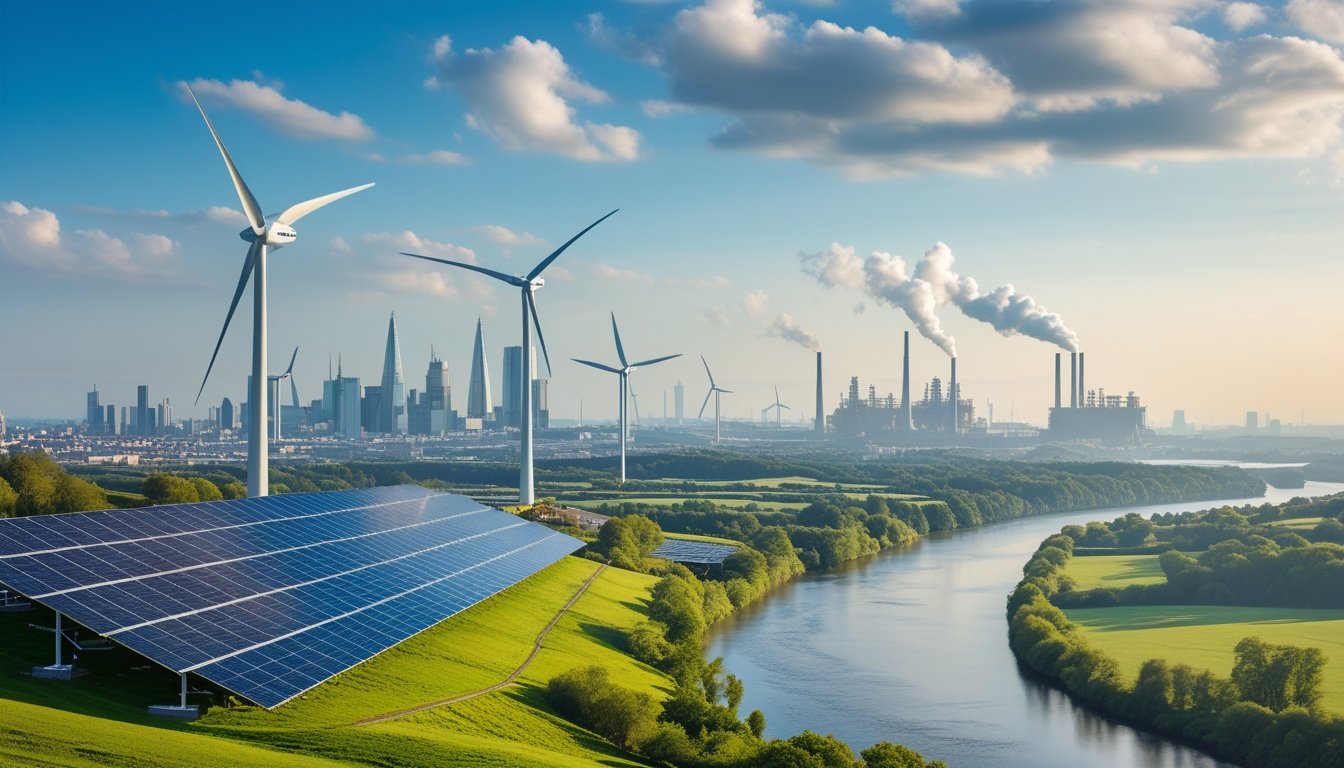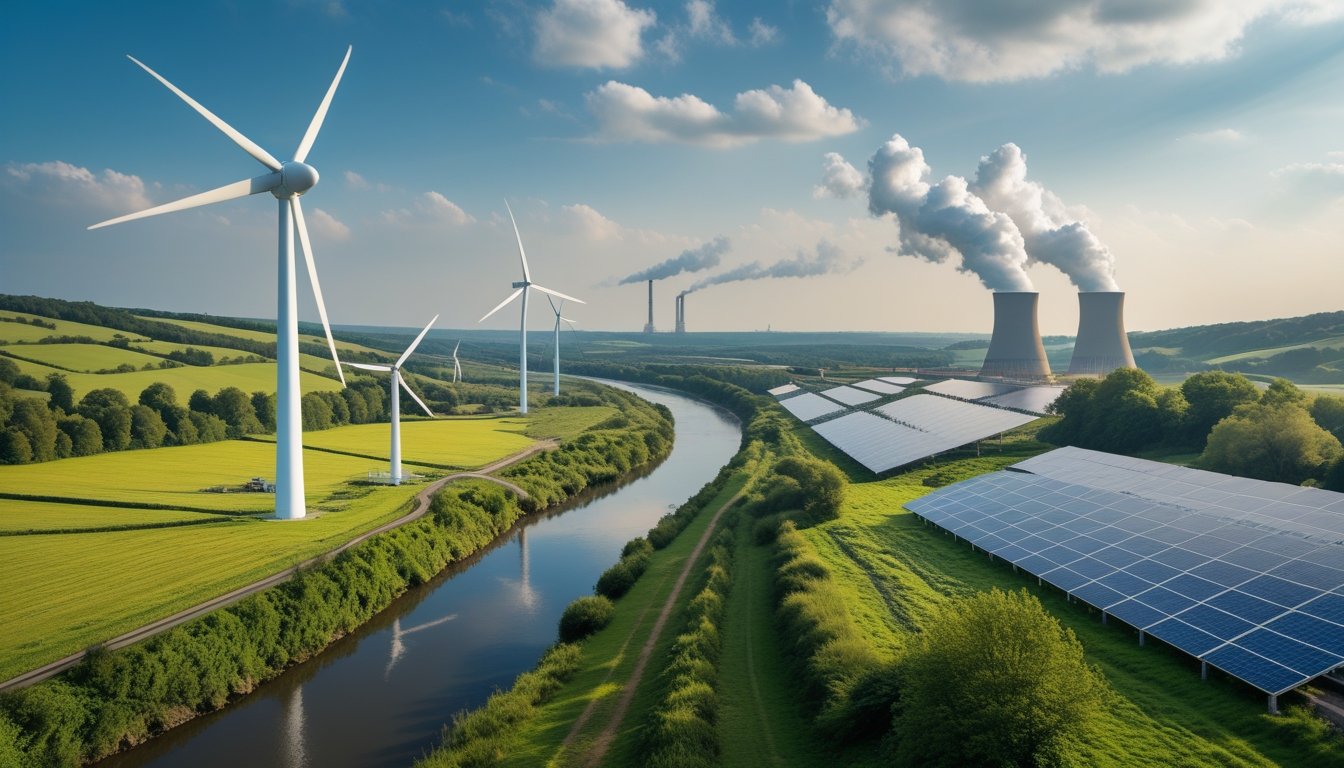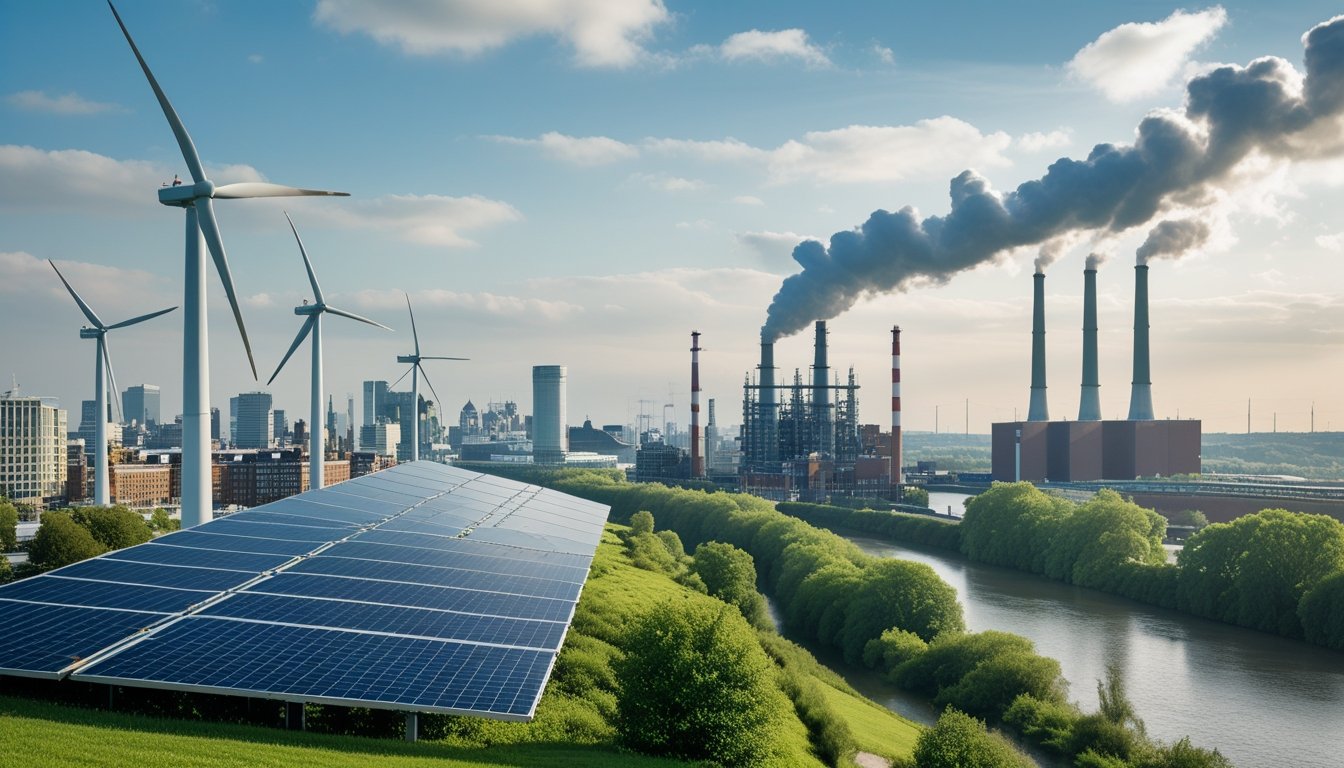Late updated: 10 Nov 2025 15:11
Written by: Eleanor Hartman
The Environmental Impact Of UK Energy Consumption: A Comprehensive Analysis
The pressing issue of energy consumption in the UK presents a significant challenge for our environment. The environmental impact of energy consumption is profound, with the UK relying heavily on fossil fuels for a large portion of its energy needs. Transitioning to more sustainable energy sources is essential to reduce the nation's carbon footprint and combat climate change.

Fossil fuels, while still making up a substantial part of our energy mix, contribute significantly to carbon emissions and air pollution. Renewable energy sources such as wind, solar, and biomass are increasingly being utilised to mitigate these adverse effects. Each of these energy sources has its own environmental implications, underscoring the need for a balanced approach.
To truly understand the impact of our energy choices, we must consider the broader effects on our environment and policies aimed at reducing dependency on non-renewable sources. By exploring the relationship between energy consumption and environmental health, we can better prepare for a sustainable future.
Key Takeaways
- UK energy use impacts the environment significantly.
- Relying less on fossil fuels can reduce emissions.
- Balancing energy sources is crucial for sustainability.
How UK Energy Consumption Affects the Environment
Our energy consumption has profound effects on the environment, from contributing greenhouse gases to influencing climate patterns. Understanding these effects is crucial for crafting policies that align with sustainable practices and climate goals.
Greenhouse Gas Emissions from Energy Use
Energy consumption in the UK is a major source of greenhouse gases such as carbon dioxide (CO2), methane, and nitrous oxide. These gases are primarily released when fossil fuels are burnt for electricity, heat, and transportation. Carbon dioxide remains the most dominant, accounting for most of the emissions, while methane and nitrous oxide contribute significantly due to activities like agriculture and waste management. Hydrofluorocarbons and other industrial gases, though smaller in volume, have a high global warming potential. The Office for National Statistics (ONS) reports underline the need for consistent tracking and mitigating strategies within the framework of the UK's Environmental Accounts.
Air and Atmospheric Pollution
The combustion of fossil fuels not only raises greenhouse gas emissions but also results in significant air pollution. Pollutants such as sulphur dioxide and nitrogen oxides contribute to the formation of acid rain, damaging ecosystems and buildings. Particulate matter and other volatile compounds impact human health, aggravating respiratory diseases. Our reliance on traditional energy sources demands strict regulations and advancements in clean energy to reduce these hazardous atmospheric emissions. Government initiatives focused on reducing emissions highlight the importance of shifting towards cleaner energy systems to improve air quality across the country.
Impact of Energy Consumption on Climate Change and Global Warming
The link between energy consumption and climate change is undeniable. As the burning of fossil fuels increases CO2 and other greenhouse gases in the atmosphere, they trap heat, leading to global warming. This warming results in rising sea levels, altered weather patterns, and increased frequency of extreme weather events. The UK's commitment to achieving net-zero emissions by 2050 necessitates a sharp reduction in these emissions. Transitioning to renewable energy sources is vital to mitigate these adverse climate impacts. The UK Environmental Accounts provide insights into tracking these emissions, enabling effective policy responses.
Links to Economic Growth and Energy Security
There exists a dynamic relationship between energy consumption, economic growth, and energy security. On one hand, energy drives economic activity, contributing to GDP growth and prosperity. On the other, reliance on imported energy can threaten energy security, especially during geopolitical tensions. Domestic renewable energy production offers a solution by enhancing energy security and reducing emissions. In the framework of the System of Environmental-Economic Accounting (SEEA), balancing economic growth with sustainable energy policies characterises the ongoing efforts towards a stable, environmentally-conscious economy. By understanding these links, we can work to ensure sustainable economic expansion that aligns with environmental objectives.
Environmental Impact of UK Energy Sources

The environmental impact of energy sources in the UK varies significantly between fossil fuels and renewables. Fossil fuels contribute to pollution and greenhouse gas emissions, while renewable energy sources offer cleaner alternatives. Transitioning towards sustainable energy and improving energy efficiency remains crucial in reducing environmental damage.
Fossil Fuels and Their Effects
Fossil fuels, including coal, oil, and natural gas, play a significant role in the UK's energy consumption. Despite their energy density and reliability, their environmental impact is considerable. The combustion of these fuels releases high levels of carbon dioxide (CO₂) and other pollutants. CO₂ emissions from fossil fuels contribute heavily to climate change. Oil refining and crude oil usage also result in localised environmental issues such as oil spills, which have detrimental effects on marine ecosystems. In the UK, fossil fuels account for a considerable percentage of total energy consumption, posing substantial challenges to environmental sustainability.
Renewable Energy Sources and Environmental Benefits
Renewable energy sources like solar energy, wind power, and hydropower offer substantial environmental benefits. Solar farms and solar photovoltaic systems convert sunlight into electricity without emitting greenhouse gases. Wind turbines, notably in offshore wind farms, harness wind energy efficiently, contributing to the UK’s goal of reducing carbon emissions. Hydropower, although less prevalent, uses dams to generate electricity while maintaining low emissions. Additionally, bioenergy from biomass, biogas, and anaerobic digestion reduces reliance on fossil fuels. These renewables not only mitigate pollution but also bring us closer to achieving environmental sustainability targets.
Transition to Cleaner and Sustainable Energy
The transition to cleaner energy involves scaling up renewable resources and reducing reliance on fossil fuels. Policies and investments are required to meet the ambitious targets set by agreements like the Paris Agreement. By adopting energy storage solutions and environmental protection measures, the UK aims to enhance the resilience and reliability of its energy systems. Government initiatives, such as the Department for Energy Security and Net Zero, support the shift towards cleaner energy. Promoting environmental goods and services and imposing environmental taxes are critical for encouraging both private and public sectors to adapt to sustainable practices.
Energy Efficiency and Emission Reduction
Improving energy efficiency is a cornerstone strategy for reducing emissions. Innovations in technology and building design help decrease energy consumption while maintaining comfort and functionality. Energy-efficient appliances, better insulation, and municipal solid waste combustion play roles in this effort. By cutting energy waste, we can significantly lower CO₂ emissions. Environmental sustainability is bolstered by reduced energy demands, aligning with goals set forth by international protocols like the Kyoto Protocol. As we continue to explore energy-efficient solutions, reductions in environmental protection expenditure provide economic and ecological benefits.
Frequently Asked Questions

In addressing the environmental impacts of UK's energy consumption, the focus is on governmental actions, energy use in households and transportation, as well as the integration of renewable energy and smart grid systems. Additionally, enhancing energy efficiency in buildings plays a significant role.
What measures are the UK government implementing to reduce carbon emissions in energy production?
The UK government is investing heavily in renewable energy technologies. This includes funding for wind, solar, and tidal energy projects. These efforts aim to meet national carbon reduction targets and support an energy transition away from fossil fuels.
How does household energy use in the UK contribute to the country’s overall carbon footprint?
Households in the UK account for a significant portion of energy use, primarily through heating and electricity consumption. This demand contributes notably to carbon emissions. Promoting energy-efficient appliances and encouraging sustainable practices can help mitigate this impact.
What is the role of renewable energy in mitigating environmental impacts within the UK energy sector?
Renewable energy sources reduce reliance on fossil fuels, thereby lowering greenhouse gas emissions. Wind and solar power have become increasingly important, offering cleaner alternatives that contribute to a more sustainable energy mix. The shift to renewables supports environmental goals and improves air quality.
What are the environmental benefits of the UK transitioning to a smart grid system?
A smart grid enhances the efficiency and reliability of electricity distribution. Its use optimises energy use, reduces waste, and incorporates renewable sources more effectively. By minimising energy loss and improving resource management, smart grids are pivotal in decreasing environmental harm.
How does the energy consumption in transport within the UK affect the environment?
The transport sector is a significant source of emissions, primarily due to fossil fuel consumption. Efforts to promote electric vehicles and expand public transport infrastructure are essential. These strategies aim to reduce the carbon footprint and improve air quality in urban areas.
What strategies are in place to improve energy efficiency in UK buildings, and what impact does this have on the environment?
Energy efficiency in UK buildings is achieved through regulations and retrofitting initiatives. This includes improved insulation, energy-saving lighting, and efficient heating systems. These measures contribute to lower energy consumption and reduced carbon emissions, aiding in achieving environmental targets.